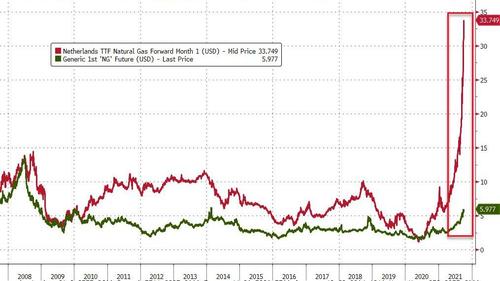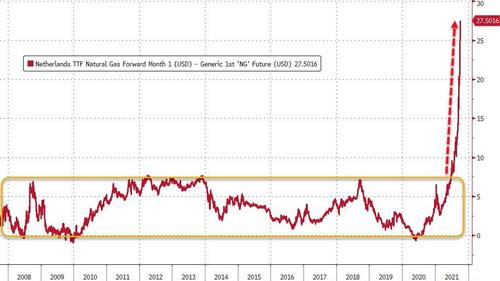Via ZeroHedge:
Just one week ago, we highlighted the first victim of the latest "rogue wave" in global natural gas markets.
As Miami-based Statar Capital gave up its "hefty gains" from earlier in the year, tumbling into the red amid the NatGas market turbulence, we warned that it would not be the last fund to admit major losses through this period of chaos.
It appears we were right, and three years after James Cordier - head trader at OptionsSellers.com - became infamous after a "catastrophic loss event" thanks to a "rogue wave" in NatGas options markets, Reuters reports on what could be the next escalation in energy markets,
Seven sources with direct knowledge of the matter told Reuters that the world's top commodity trading houses are being told by brokers and exchanges to deposit hundreds of millions of dollars in extra funds to cover their exposure to soaring gas prices.
Glencore, Gunvor, Trafigura and Vitol are among the commodity merchants facing massive margin calls on their positions in natural gas markets across Europe and US.
According to reports, it appears the trading shops have all been hammered by a spread (or arbitrage trade) gone wrong.
For years, the prices of European (red) and US natural gas (green) have traded within a well-defined range. When the spread between the two reaches one extreme or the other, you buy one and sell the other - easy, right?
Source: Bloomberg
So as European NatGas prices surged in Q2, it reached a notable extreme relative to US NatGas, prompting traders to instigate the strategy of selling European Gas and Buying US Gas in the hopes the spread compresses.
The strategy backfired last month when European gas prices soared due to a variety of factors including low inventories, high demand for gas in Asia, low Russian and LNG supply to Europe, and outages.
Source: Bloomberg
As the chart above makes clear, this is not just a modest break of the strategy, it's a multiple-sigma collapse of what was - for 12 years - a relatively low risk, slow reversion strategy.
Officials are of course playing down this report:...
....MORE

